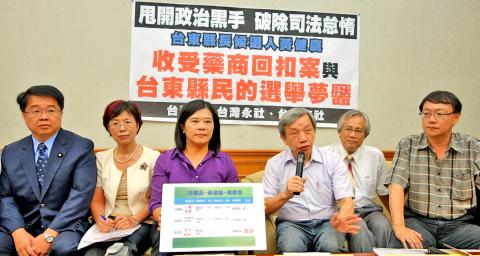Legislators and representatives of civic groups yesterday berated the judiciary for what they said was six years of inaction over a corruption case involving Taitung County Commissioner Huang Chien-ting (黃健庭).
Huang was charged with corruption in 2008, when he was a Chinese Nationalist Party (KMT) legislator.
He allegedly received bribes and kickbacks from pharmaceutical companies for helping secure drug supply contracts for public hospitals and clinics in Taitung County. Six years on, the remains in the preliminary stages in court, and Huang is running for re-election as county commissioner.

Photo: Liu Hsin-de, Taipei Times
Taiwan Society president Chang Yen-hsien (張炎憲) told a news conference in Taipei that there were very unusual and suspicious circumstances surrounding Huang’s case, since the judiciary has not moved against him.
“It is a miscarriage of justice, because the judiciary appears to be showing favoritism to Huang, a KMT member,” Chang said.
“Who is manipulating our judiciary system behind the scenes?” Chang said, adding that President Ma Ying-jeou (馬英九) and National Security Council Secretary-General King Pu-tsung (金溥聰), a long-time top aide to Ma, might be responsible.
“Ma and King have the power to manipulate the judiciary. They have interfered to protect their political ally, Huang. It is very worrying to see such abuse of political power,” Chang said.
“How can people trust the judicial system? People see it becoming an instrument to protect KMT politicians and officials. By stalling legal proceeding, people affiliated with the KMT can escape prosecution and can get away with their pervasive corruption and profiteering actions,” he said.
Democratic Progressive Party (DPP) Legislator Wu Ping-jui (吳秉叡) said the initial stage of most cases is wrapped up in 16 months.
“Why is this corruption case against Huang now in its sixth year? Why has there been no progress? Wu said.
Huang served out his term as legislator, was able to win election as Taitung County commissioner and is now running for a second term, which means “all Taitung residents could be losers in this affair because they might be voting for someone who could be found guilty of corruption,” Wu said.
DPP Legislator Wu Yi-chen (吳宜臻) criticized the judicial system for meting out different treatment based on political party affiliations.
“We keep on seeing the judiciary taking a delayed approach or no action when dealing with cases involving KMT and pan-blue camp people. However, the judiciary always moves swiftly in cases involving the DPP and the pan-green camp,” Wu said.
“The judicial system is showing its double standards and favoritism in this case. It has taken no action, no legal proceedings against Huang, although there is enough evidence against him. The judiciary is treating people of Taitung as fools,” she said.
Wu said it was obvious there has been a political pressure on judges against moving on this case.
“We see the KMT leaders subverting and destroying Taiwan’s judicial system. How long can the judiciary remain a tool of the KMT? The public will no longer have faith in the fairness and equality of our justice system,” she said.

DAREDEVIL: Honnold said it had always been a dream of his to climb Taipei 101, while a Netflix producer said the skyscraper was ‘a real icon of this country’ US climber Alex Honnold yesterday took on Taiwan’s tallest building, becoming the first person to scale Taipei 101 without a rope, harness or safety net. Hundreds of spectators gathered at the base of the 101-story skyscraper to watch Honnold, 40, embark on his daredevil feat, which was also broadcast live on Netflix. Dressed in a red T-shirt and yellow custom-made climbing shoes, Honnold swiftly moved up the southeast face of the glass and steel building. At one point, he stepped onto a platform midway up to wave down at fans and onlookers who were taking photos. People watching from inside

A Vietnamese migrant worker yesterday won NT$12 million (US$379,627) on a Lunar New Year scratch card in Kaohsiung as part of Taiwan Lottery Co’s (台灣彩券) “NT$12 Million Grand Fortune” (1200萬大吉利) game. The man was the first top-prize winner of the new game launched on Jan. 6 to mark the Lunar New Year. Three Vietnamese migrant workers visited a Taiwan Lottery shop on Xinyue Street in Kaohsiung’s Gangshan District (崗山), a store representative said. The player bought multiple tickets and, after winning nothing, held the final lottery ticket in one hand and rubbed the store’s statue of the Maitreya Buddha’s belly with the other,

‘NATO-PLUS’: ‘Our strategic partners in the Indo-Pacific are facing increasing aggression by the Chinese Communist Party,’ US Representative Rob Wittman said The US House of Representatives on Monday released its version of the Consolidated Appropriations Act, which includes US$1.15 billion to support security cooperation with Taiwan. The omnibus act, covering US$1.2 trillion of spending, allocates US$1 billion for the Taiwan Security Cooperation Initiative, as well as US$150 million for the replacement of defense articles and reimbursement of defense services provided to Taiwan. The fund allocations were based on the US National Defense Authorization Act for fiscal 2026 that was passed by the US Congress last month and authorized up to US$1 billion to the US Defense Security Cooperation Agency in support of the

HIGH-TECH DEAL: Chipmakers that expand in the US would be able to import up to 2.5 times their new capacity with no extra tariffs during an approved construction period Taiwan aims to build a “democratic” high-tech supply chain with the US and form a strategic artificial intelligence (AI) partnership under the new tariffs deal it sealed with Washington last week, Taipei’s top negotiator in the talks said yesterday. US President Donald Trump has pushed Taiwan, a major producer of semiconductors which runs a large trade surplus with the US, to invest more in the US, specifically in chips that power AI. Under the terms of the long-negotiated deal, chipmakers such as Taiwan Semiconductor Manufacturing Co (TSMC, 台積電) that expand US production would incur a lower tariff on semiconductors or related manufacturing